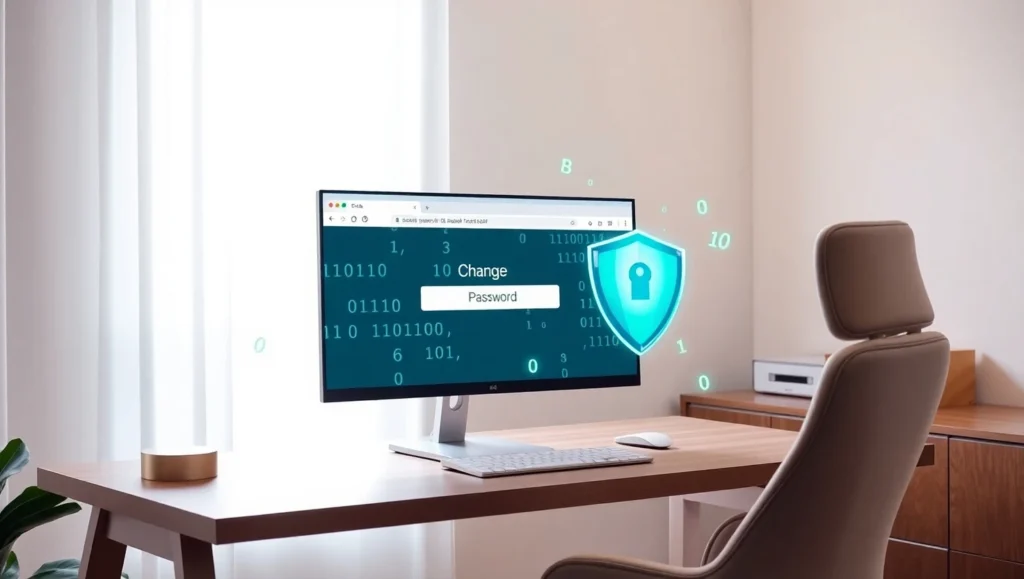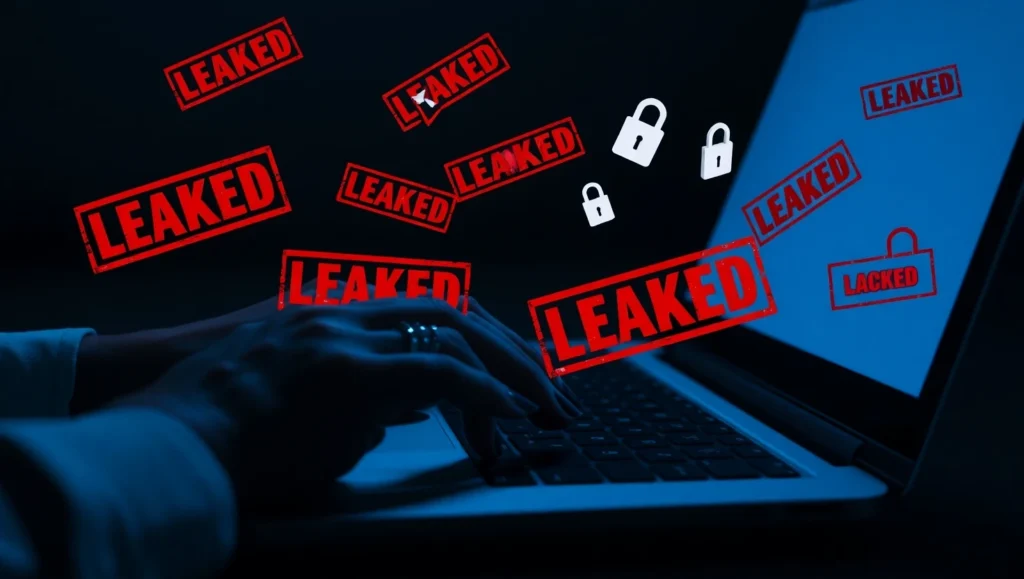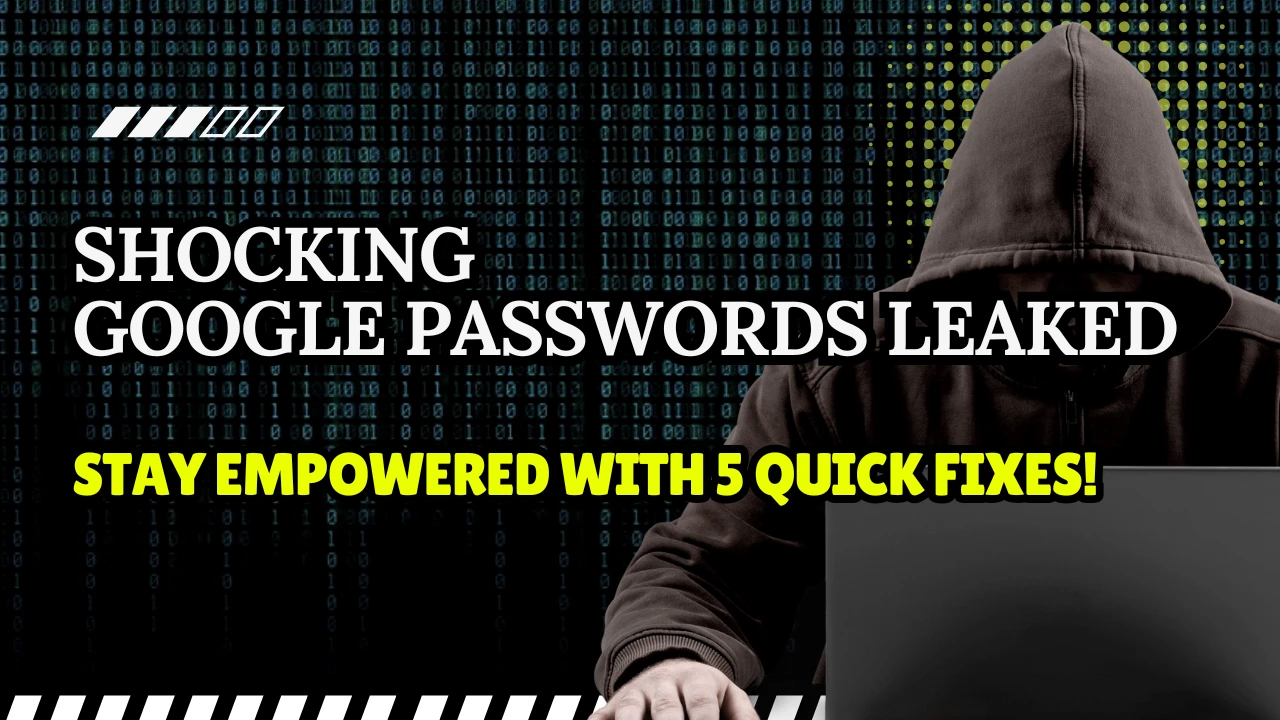Table of Contents
Shocking Google Passwords Leaked: The staggering amount of passwords for Apple, Facebook, Google as well as other US government agencies are being leaked online leading to global security alerts according to experts. This is the biggest security breach of the past century.
The massive security breach caused Google to ask millions of users to update their passwords right away. The same time it is reported that the FBI has issued a series of warnings to Americans concerning opening links they suspect within SMS messages.

Google Data Breach Update: What You Need to Know
Cybersecurity specialists from Cybernews have been investigating the hack, found massive 30 datasets that were exposed, containing hundreds of millions to greater than 3.5 billion records per. The most concerning thing is that researchers discovered that a majority of these disclosed datasets have previously not reported data, resulting in an entirely new security issue.
“This is not just a leak – it’s a blueprint for mass exploitation,” researchers told Forbes the week prior to this. The information leaked is mostly composed of URLs coupled with usernames and passwords for login that could allow the hackers entry to “pretty much any online service imaginable, from Apple, Facebook, and Google, to GitHub, Telegram, and various government services.”
The data was available for a brief time – enough for researchers to discover, but it was too fast it was difficult for researchers to pinpoint the person who was responsible for the information.
“These aren’t just old breaches being recycled,” researchers declared. “This is fresh, weaponisable intelligence at scale.”
Cybernews Investigators suspect that the attack is the result by a number of “infostealers” – malicious programs created to collect the credentials of infected devices. Although the exact quantity of victims is not known, experts in security advise the general people to immediately take precautions.

Understanding the Scope of the Security Breach
When it comes to online security, ignorance is not bliss. Recently, a list of compromised Google passwords surfaced online, and the findings were shocking yet telltale of our collective neglect towards digital security. The most common offenders were simple numeric sequences like ‘123456’ or predictable choices like ‘password’. Such passwords are a cybercriminal’s dream come true, offering easy access to personal information.
Why People Choose Simple Passwords
- Ease of Recall: The ability to remember passwords conveniently often leads to simplistic choices.
- Proliferation of Accounts: With the rise of online platforms, it’s daunting to set and remember complex passwords for each one.
- Overconfidence in Security Measures: Users often rely solely on the surface-level security measures provided by platforms.
- Shocking Google Passwords Leaked
“Passwords are like underwear: you shouldn’t leave them out where people can see them. You should change them regularly, and you shouldn’t share them with strangers.” – Chris Pirillo

The Wake-Up Call: Why Strong Passwords Matter
Understanding the importance of a strong password can be a game-changer. A strong password is your first line of defense against unauthorized access to your accounts.
Characteristics of a Strong Password
- Length and Complexity: At least 12 characters long with a mix of letters, numbers, and symbols.
- Unpredictability: Avoid using easily guessed details like your name or birth date.
- Passphrases Over Passwords: Combine several unrelated words or a full sentence.
- Shocking Google Passwords Leaked
A quick glimpse into a world where your account falls into the wrong hands paints quite the dire picture. Imagine an intruder with access to your emails, banking information, and personal data. Now, picture a robust password standing like a fortress gate, preventing such invasions.

5 Quick Fixes to Empower Your Online Security
1. Create and Manage Passwords with a Vault
Consider using password managers such as LastPass or 1Password. These handy tools not only generate complex passwords but also remember them for you, ensuring a seamless yet secure online experience.
2. Enable Two-Factor Authentication (2FA)
Adding an extra layer of security is always wise. 2FA requires both your password and a second factor—often a code sent to your mobile device—before granting access.
3. Stay Informed and Cautious
Keep yourself updated on the latest security breaches and techniques used by hackers. This knowledge keeps you vigilant and prepared to adapt to evolving threats.
4. Differentiate Passwords Across Platforms
Using the same password across different sites is risky. Opt to create unique passwords for each account to contain any potential breach to a single platform.
5. Regularly Update Your Passwords
Routine changes in passwords can thwart the lurking eyes of past phishing attempts. Make it a practice to update passwords periodically.

Staying Proactive: The Key to Peace of Mind
We’ve realized that online security is not something to be taken lightly. Implementing these quick fixes can significantly enhance your digital defense. So why not start today?
Try revisiting your password manager or setting up 2FA in the coming days. Because peace of mind while navigating the virtual space is invaluable, and you’re equipped to make it a reality.
“Your password is a key; protect it as you would the keys to your home.”
In a world full of digital opportunities and threats alike, being proactive and informed is your best defense. Let’s make sure our futures are safe, one password at a time. Stay secure, internet allies!

Frequently Asked Questions (FAQs) About Shocking Google Passwords Leaked
What exactly happened in the “Shocking Google Passwords Leaked” breach?
A massive data breach exposed over 30 datasets containing hundreds of millions to more than 3.5 billion records of usernames, passwords, and URLs—impacting Google alongside Apple, Facebook, GitHub, Telegram, and various U.S. government services. Many of these datasets were previously unknown, making this the largest, most “weaponisable” leak of credentials in recent history. Shocking Google Passwords Leaked
How did Google respond to the breach?
Upon discovering the leak, Google issued a prompt to millions of users to immediately update their passwords. They also reinforced automated protections (like login risk assessments) and encouraged everyone to enable stronger authentication measures. Shocking Google Passwords Leaked
What role did “infostealers” play in this hack?
Cybersecurity experts believe multiple infostealer malware families—programs designed to silently harvest login credentials from infected devices—were responsible. These stealthy tools extracted usernames and passwords directly from browsers or system memory before uploading them to attacker-controlled servers. Shocking Google Passwords Leaked
Could my account have been compromised if I use strong passwords?
While strong, unique passwords drastically reduce risk, no single measure is foolproof. If you reuse a strong password across sites, the breach of one service could expose your credentials elsewhere. Always combine complex passwords with additional safeguards like two‑factor authentication. Shocking Google Passwords Leaked
How can I check if my account was part of this breach?
Use reputable “breach-check” services (for example, Have I Been Pwned) to search your email address or username. Google also provides a built‑in Password Checkup tool in Chrome settings that flags compromised credentials and prompts you to change them immediately. Shocking Google Passwords Leaked
What are the “5 Quick Fixes” to protect myself now?
1. Use a password manager to generate and store unique, complex passwords.
2. Enable two‑factor authentication (2FA) on all critical accounts.
3. Stay informed—monitor trusted cybersecurity news for emerging threats.
4. Never reuse passwords across different sites or services.
5. Update passwords regularly, at least every 3–6 months for high‑value accounts.
Shocking Google Passwords Leaked
Why is two‑factor authentication (2FA) so important?
2FA adds a second verification layer (e.g., a code sent to your phone or generated by an authenticator app) on top of your password. Even if your password is leaked, attackers can’t access your account without this additional factor. Shocking Google Passwords Leaked
What precautions should I take against phishing SMS messages?
The FBI warns against clicking suspicious links in texts. Always verify the sender, avoid unsolicited URLs, and enable SMS‑filtering features. When in doubt, navigate directly to the organization’s official website rather than tapping a link in a message. Shocking Google Passwords Leaked
How often should I change my passwords after a breach of this scale?
For critical services—banks, email, government portals—update passwords immediately and then every 3–6 months. For lower‑risk accounts, aim for at least an annual rotation. Regular updates limit the window of opportunity for attackers using stolen credentials. Shocking Google Passwords Leaked
What long‑term habits can I adopt to stay ahead of future breaches?
Adopt passphrases: Use memorable sentences or word combinations at least 12 characters long.
Monitor account activity: Review login notifications and security emails for unauthorized access.
Keep software patched: Ensure your OS, browser, and security tools are always up to date.
Use hardware security keys: For maximum protection, consider FIDO2-compatible keys as your 2FA method.
Educate yourself: Follow reliable cybersecurity blogs and advisories to stay aware of new threats.
Shocking Google Passwords Leaked
